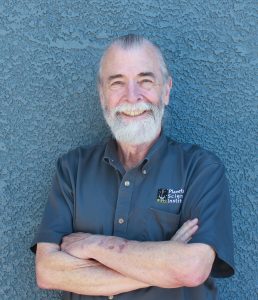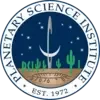May 1, 2025, TUCSON, Ariz. – Today, Amanda Hendrix begins as the next director and CEO of the Planetary Science Institute. She succeeds Mark V. Sykes, who oversaw tremendous growth at the Institute during his 21-year tenure.
“I am thrilled to step into this role and to lead the Institute as it continues to engage in world-class science and research, and I’m excited to grow those opportunities,” said Hendrix, who was selected by the PSI Board of Trustees in October 2024 and served as deputy CEO for the past four months. “PSI hosts a brilliant, wonderfully creative staff with scientists in more than 30 states and 13 countries. It really is a remarkable, unique institution.”
PSI is involved in all NASA Solar System exploration missions and is the largest private employer of planetary scientists in the world and serves several key functions.
“First and foremost, we support our scientists and strive to offer a collaborative culture and stimulating environment. We provide critical education and outreach opportunities in the local and broader arenas, and we advocate for the wider planetary science community,” Hendrix said. “A primary goal, as we move forward, is to continue these functions and to strengthen them. I look forward to working with our local partners in southern Arizona and those in Washington D.C. and elsewhere to build and bolster the relationships that are so important in making our work happen. We are fortunate to have an outstanding administrative staff. I am so pleased to be working with them, along with our dedicated Board of Trustees, to advance all of these Institute priorities.”
Sykes added, “PSI has been an internationally recognized organization for more than 50 years and has always been a very collegial, mutually supportive group of scientists, focused on what they loved most – their science. That culture was nurtured by our founders and early generations of scientists and deeply informs the culture of the Institute today.”
PSI’s new leader
Hendrix boasts more than 25 years of experience in planetary science, more than 12 of which were spent as a PSI senior scientist. Her research focuses on ultraviolet and visible spectroscopy of Solar System surfaces, including moons, small bodies and ocean worlds to understand surface composition and space weathering effects.
Hendrix received a Bachelor’s of Science in Aeronautical Engineering from California Polytechnic State University, San Luis Obispo and Master’s of Science and Doctoral Degrees in Aerospace Engineering Sciences from the University of Colorado Boulder.
As a graduate student and post-doctoral researcher at the Laboratory for Atmospheric and Space Physics at the University of Colorado, Hendrix gained valuable experience in ultraviolet spectroscopy and instrumentation. Then, she spent 12 years at NASA’s Jet Propulsion Laboratory and served as deputy project scientist on NASA’s Cassini–Huygens mission, before moving to PSI in 2012.
She was a co-investigator on the Galileo Ultraviolet Spectrograph and the Cassini Ultraviolet Imaging Spectrograph instruments, and is currently a co-investigator on the Lunar Reconnaissance Orbiter’s Lyman Alpha Mapping Project, or LAMP, instrument. She is a member of the Europa Clipper Ultraviolet Spectrograph science team. She has been a principal investigator on numerous NASA research and data analysis and Hubble Space Telescope programs.
Hendrix is currently the principal investigator on NASA’s Toolbox for Research and Exploration, or TREX, program to develop tools and research methods for exploration of airless surfaces in preparation for human and robotic in-situ resource utilization missions. She is a leader in the planetary community, having chaired the Division for Planetary Sciences of the American Astronomical Society and the NASA Outer Planets Assessment Group. She also serves as a member of the NASA Advisory Council and chaired and served on committees of the National Academies. Hendrix has been honored by the International Astronomical Union by the naming of Minor Planet 6813 Amandahendrix and is a Fellow of the American Astronomical Society.
Hendrix co-authored “Beyond Earth: Our Path to a New Home in the Planets,” published by Penguin/Random House. Besides research, she enjoys teaching and sharing her love of planetary science with students and the public.
More than 20 years of growth

Sykes was hired to lead PSI in 2004. Over the last 21 years, he has ushered in enormous growth. Revenue has more than quintupled from $3.3 million to nearly $18 million today, while net assets increased from just under $200,000 to more than $3.4 million. Projects increased from 76 in his first year to 283 active projects in fiscal year 2024.
The number of employees increased from 47 to over 170 – roughly 130 of whom are principal investigators. Also, during his tenure, Sykes oversaw the opening of the PSI Lakewood, Colorado office located west of Denver in 2016 to accommodate the burgeoning Institute.
Sykes received his Doctor of Philosophy in Planetary Sciences in 1986 and Juris Doctor in 1998 from the University of Arizona. He is a member of the Arizona Bar and admitted to the Federal District Court of Arizona. He is also a professional musician and has performed more than 30 seasons with the Arizona Opera Company’s chorus. Sykes will remain at PSI as a senior scientist.
Read more about Sykes and his personal and professional history here.
“I plan to continue advocacy for the planetary community in these challenging times but also look forward to doing more science,” Sykes said. “There is more than a career’s worth of work to do! I’ll be spending more time visiting my grandchildren in Chicago, family in Oregon and training to run my first marathon, which will be held in Scotland this fall.”
###
MEDIA CONTACT:
Mikayla Mace Kelley
Public Information Officer
PSI INFORMATION
Amanda Hendrix
Director
PSI HOMEPAGE
PSI PRESS RELEASES
https://www.psi.edu/press-releases/
THE PLANETARY SCIENCE INSTITUTE
The Planetary Science Institute is a private, nonprofit 501(c)(3) corporation dedicated to Solar System exploration. It is headquartered in Tucson, Arizona, where it was founded in 1972.
PSI scientists are involved in numerous NASA and international missions, the study of Mars and other planets, the Moon, asteroids, comets, interplanetary dust, impact physics, the origin of the Solar System, extra-solar planet formation, dynamics, the rise of life, and other areas of research. They conduct fieldwork on all continents around the world. They are also actively involved in science education and public outreach through school programs, children’s books, popular science books and art.
PSI scientists are based in 32 states, the District of Columbia and several international locations.

